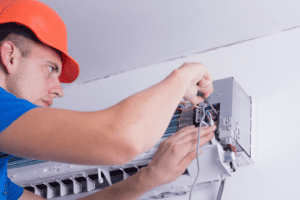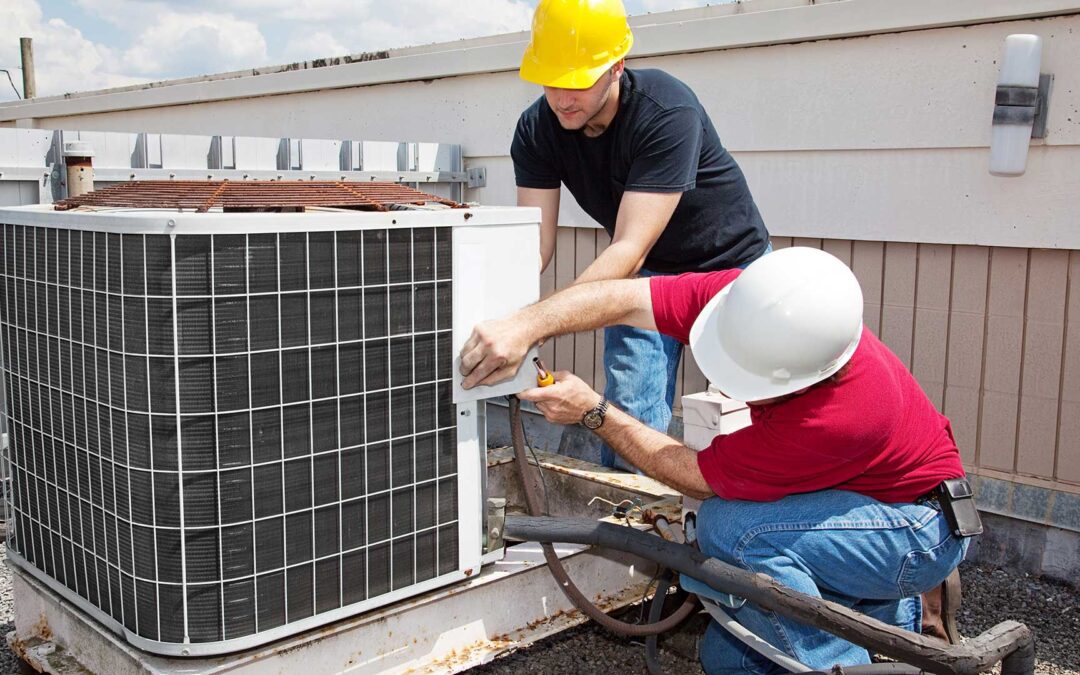Your commercial air conditioner plays an incredibly valuable role for yourself and your employees. When the weather heats up around your office, you’ll all rely on your AC to keep things “chill” at work. However, commercial air conditioners are sensitive machines that require care and attention to perform their best. It is advisable to familiarize yourself with some of its key components so that you can keep an eye out for problems and keep the cooling system in optimal condition. One of the most critical parts of any system will be the air conditioning compressor.
 No AC can function without an air conditioning compressor. The compressor is responsible for causing the refrigerant in the system to change states. Refrigerant is a chemical that runs through your air conditioning system. It is often comprised of Freon, which smoothly changes states under enough pressure.
No AC can function without an air conditioning compressor. The compressor is responsible for causing the refrigerant in the system to change states. Refrigerant is a chemical that runs through your air conditioning system. It is often comprised of Freon, which smoothly changes states under enough pressure.
The compressor’s job is to provide that pressure. When refrigerant enters the compressor, it does so in a liquid form. This liquid coolant begins at a relatively low level of both pressure and temperature. However, the compressor constricts the refrigerant until it’s pressure rises. As this occurs, the coolant also goes through a temperature change by drawing heat from the air around it. This causes the air in your office to become cooler. Eventually, the added pressure and heat change the refrigerant into a gas, which flows out of the compressor and releases the heat into the air outside via the outdoor unit.
Compressors are extremely important, but they’re also highly sensitive. Numerous factors can cause a compressor to fail, and once it does, it’s costly to replace. New compressors typically cost more than a thousand dollars, so preventing failure will undoubtedly be preferable to buying a new one. The good news is that compressor failure is almost never random. In 98% of cases, compressor failure is due to a preventable problem elsewhere in the system. Below are some red flags that can tell you when your commercial air conditioner’s compressor is in danger:
- A Polluted Condenser or Evaporator
The coils in the evaporator and condenser are responsible for allowing the refrigerant to draw heat from the air or release heat into it. When they become dirty, it is more difficult for the refrigerant to change states. As a result, the compressor must work harder to condense the refrigerant before it can convert it into a gas. Over time, this causes the compressor to wear itself out and eventually fail entirely. If your AC is running, but the air in your office is taking a long time to cool, a dirty condenser or evaporator may be the problem.
You can protect a compressor by changing the filters in the system regularly to keep dirt and dust from entering it, but that’s not all. You should also arrange to have a qualified HVAC technician clean the aircon ducts every three to five years, and check the coils during yearly service calls to make sure they are free from grime.
- Loose Fan Belts
An improperly sized fan in the evaporator can cause it to stop blowing air across the coils, which makes it harder for the refrigerant to absorb heat. An appropriately sized fan belt that has come loose can cause the same problem. When the coolant can’t absorb heat properly, the compressor will strain itself trying to convert it into a gas. Make sure that your HVAC technician checks the fan belts during each service call.
- Incorrect Refrigerant Charges
Sometimes the components and systems that help refrigerant to circulate through the system are operating perfectly—the problem is the refrigerant itself. When there is too much or too little coolant for the size of the system, the compressor will struggle to deal with it. It is vital that your AC is installed by a licensed technician who can make sure it has an appropriate amount of refrigerant before you start using it. However, refrigerant can also be lost over time as leaks occur, so make sure you invest in yearly service calls to check for them. You may also be able to identify a refrigerant leak by looking for liquid near your HVAC that isn’t water.
- Poorly Adjusted Expansion Valve
Expansion valves are an essential part of all AC systems, from those in offices to homes and vehicles. The function of an expansion valve is to regulate the flow of refrigerant through the system. If it is not adjusted correctly, the compressor will find itself with either too much or too little refrigerant to work with, and ultimately fail from over- or under-use. A qualified HVAC tech will examine the expansion valve as part of their routine checkup on the system, and correct it if necessary.
- Worn Out Contactors or Relays
Relays and contactors are just names for switches that control the AC’s electrical components. They will automatically cause the compressor to start under certain conditions. However, these parts can wear out from use over time and ultimately stop performing their function. If the compressor is not turning on according to the thermostat settings, you may just need to have the switches replaced.
Understanding how a compressor functions and how it can be affected by trouble elsewhere in the system can allow you to be proactive and find help before it’s too late. Keep this guide handy, and make sure that you know who to contact for support whenever one of the issues above occurs.
Check with us here at Valley Comfort Heating and Air, our customers love our attention to detail and our friendly, affordable service. (707) 539-4533

